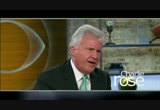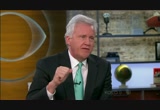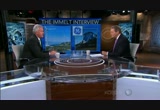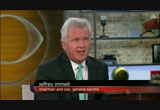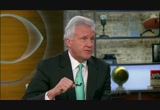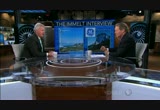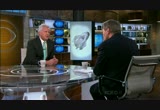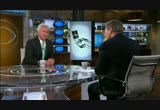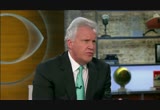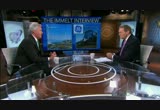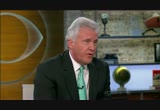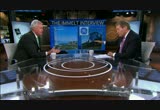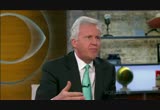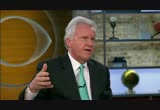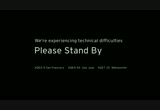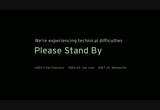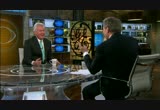tv Charlie Rose PBS December 11, 2012 12:00am-1:00am PST
12:00 am
and you go through these kind of economic times like we've had the last decade and it's just -- i think the difference may be -- so few things -- you know, you wake up one morning and fukushima disaster has taken place. now, the night before i went to bed i wasn't thinking about japan. i wasn't thinking about nuclear power. and now it's all-consuming. it just seems like we're in a period of time that's volatile from a geopolitical standpoint. it's volatile from an environment, nature standpoint. >> rose: jeff immelt for the hour. next.
12:02 am
300,000 people around the world. it makes everything from aircraft engines to power plant turbines to medical imaging equipment. the company has evolved over the last decade over jeff immeant's watch. he has led a global expansion and shed once treasured businesses such as plastics and insurance. in 2011, president obama named him to lead the council on jobs and competitiveness. last month, the country created 146,000 jobs, exceeding expectations in the wake of hurricane sandy. further progress will be tested as the fiscal cliff deadline approaches without a deal inside yet. i'm very pleased to have jeff immelt back on this program. welcome >> charlie, thanks, good to be back with you. >> rose: we've talked many times about g.e. since you took over, i think once since -- just after 2001. where is the company today in terms of where do you want it to be and where do you want it to be in the next five years? >> i think, charlie, what we've tried to do is simplify the portfolio into infrastructure and financial services.
12:03 am
we like where the portfolio is today. we think in the infrastructure space there's going to be roughly $4 trillion spent each year, so it's an attractive big market. globally is where our opportunities are so the company's -- probably a decade ago 30% of our revenues were outside the united states. now it's more like 60% or 65%. so we think we've got the portfolio we want. we've dramatically increased the amount of technology. and in the end i think technology and innovation are the competitive advantage. we've got a good global footprint. we're in 140 countries. and we've got these deep relationships with customers so i think it's portfolio, technology, customers and real innovation around services and globalization and that's really where the pane is today. >> rose: one thing you're doing is something called the industrial internet. "businessweek" has a piece on that on the newsstand now. what is that and why is that so important to industry in the future?
12:04 am
>> i think every industrial company now with sensor technology and software technology has to think about the analytical way around their products. so a jet engine or m.r.i. scanner or gas turbine creates terra bytes of data. usage data. if we could model a jet engine that saves 1% fuel burn every year, that save it is industry $2 billion. that's a lot of money for our customers and we're trying to take the analyticals as expects and restructure in the a way that benefits our customers. if you think about social media, it was about connecting a billion consumers, right? and change the way they shop or do other things. the industrial internet is about really deep domain, deep verticals where 1% of anything is worth hundreds of billions of dollars. >> rose: we really have come with the internet to this emphasis on data and what data can tell us and the cloud has given us an enormous potential.
12:05 am
>> completely. information technology in and of itself creates 5% or 10% of the value. connectivity is 10% of what it's about. the rest is about better decision making, better analytics, saving money. about doctors that know how to make better diagnoses. that's where the next wave is. that's where the action is. what we're saying is, look, industrial companies stay out of that at their own peril. it's no longer a day where you say "i'm going to make the engine and let a software guy decide how it flies." that's what we're focused on. >> rose: are there businesses that still now are in the part of g.e. that you want to spin off or do you have the core companies for the future? >> i think we've got the best portfolio we've had in a decade. financial services is a lot smaller than the last time i was on your show, for obvious reasons. but we're in the range of 60% to 70% of the country is industrial
12:06 am
30% to 40% is financial. that's a pretty good balance for us. so i'd say we're about where we'd like to see the company and places where we have real competitive advantage. >> rose: someone once said the way to judge g.e. executives-- this may have been one of your predecessors-- is how they allocate capital and evaluate people. do you agree with that? >> i think there are certain core competencys that go with the company that we do as a collective. capital allocation is clearly one of them. how we develop leaders is one of them. i would say there's other technology development, i would say in some ways might be as important or more important than the other two and we do that across the company and then i would say globalization. how we really globalize. globalization is a big company game. i can go to china and not be afraid. going to africa and compete with the chinese. i can go to russia and say i can manage the risk-reward equation. so that's where a lot of new consumers are and i would say that is a core competency of a
12:07 am
multibusiness big company like g.e. so i'd say it's more than those two but those two are important. >> rose: you once said to me tell me what the global economy will look like and the domestic economy will look like and i can can tell you what g.e. will do. >> uh-huh. >> rose: look ahead to the global economy today and tell me how you see it, where it's going and pra what are the prospects for growth? >> i think the world always revolves around a couple fundamentals. one is where are the people? demographics rule. at times when the u.s. grew the fastest was times when the population was also growing the fastest. so the fact there that there's a billion new consumers joining the middle-class in the next five or ten years, you bet be with them. the second is the cost of materials so basically in in the '90s oil was $15 a barrel for a decade. now it's $80 or $100 or $120. there's a massive amount of wealth that goes with where resources go and things like
12:08 am
that that's number two. number see there innovation. where is is the innovation taking place? is it silicon valley? bangalore? other places. so i would say demographics, natural resources, where's the innovation? that's what rules. now, in the case of aviation -- let's take that business. revenue miles are growing 4% or 5% every year because people are flying around the world. but the three biggest airlines in the world today, if you went back ten years and if i said to you the three biggest airlines are going to be emirates and qatar airlines -- >> rose: you're losing it. >> completely in another -- well not american airlines and stuff like that. so that's what -- you've got to be following those trends. now, those trends don't stay the same. in the case of the united states what's different today than ten years ago, this is a country that's rich in energy. the shale gas revolution is real.
12:09 am
so maybe you thought your energy strategy was going to take you to africa or saudi arabia or other places. now you come right back around and bring it back here and that's meaningful. >> rose: let's talk about energy and i'll come back to the global picture. i especially want to talk about how you see africa and china and india. looking at energy today, are you in the business of nuclear reactors? >> uh-huh. >> rose: there are people saying because of these new developments in natural gas the demand for nuclear reactors will not be the same. >> uh-huh. >> rose: do you buy that? >> i think it's true. there's no one global answer so u.s. and europe and china are going to have different strategies. but the notion that in this region gas could be $2 to $3 or even $5 $6 for a million b.t.u.s shifts nuke fear this country out over a period of time. there may be a few new reactors built, but not many. >> rose: when do we have energy independence because of the online production of shale? >> here's what i would say,
12:10 am
charlie. in other words, somebody who's smarter than i am should pick what's the right strategy. is it independence? is it security? is it something like that? but between canada, mexico, and the united states this region, the and a half a region, could be energy independent very soon. this region could probably be the most powerful or one of the most powerful energy producing regions in the world. and shale gas is just a game changer. it's just -- it's just a game changer is it a pan see yaw yah? no. but it opens up doors and that's something we should have high on the lists of things to do. >> rose: when you see that, what could disrupt that possibility of shale gas playing the role of -- that you see it? >> it exists. so in other words the seismic aspect of it is very real.
12:11 am
it exists. what you need to commercialize it is a set of pipelines or a set of capabilities inside a country which the u.s. is pretty good at. you need some new demand. are you going to convert automobiles or other things to natural gas? then i think there's the environmental aspect. nobody wants to do this in ways that harm the environment, but there's ways to solve those problems. so i'd say if you said early on what's the biggest risk to fully developing a resource like that? it's going to be in the environmental side because i think the other things -- there's plenty of capital to solve it. >> rose: so what's the possibility for green energy and alternative energy? >> the first thing i'd say is natural gas in and of itself is inherently greener than the current base so -- >> rose: but you are -- wind -- >> i think wind will continue. i think solar will still be part of the mix. you know, again, i've always advocated for very broad energy -- set of energy solutions. because you never are quite
12:12 am
smart enough to figure out which one is going to break through the door at any given point in time. but clearly gas is going to be a bigger part of the mix in the united states going forward. globally -- japan doesn't have any gas so they've got to figure out post-fukushima what they do. europe has to figure out do they want to import gas from russia or build nuclear -- so everybody's got their own set of challenges. but i'm here to tell you this that this country-- unlike any other time in my lifetime-- has more options that are positive than ever before. >> rose: you're bullish on america? >> i think on the energy side for sure. and i'd say on the -- the one thing that never goes away in the united states is the incredible accept of entrepreneurs. so i think if we can get a set of great entrepreneurs, we can go after some big opportunities like energy. there's no reason why the united states can't continue to grow. >> rose: can manufacturing come back to america? >> if you looked -- i'm 30 year g.e. guy. so when i started it was
12:13 am
probably 25% of american jobs were manufacturing, now it's 9%. so it is going to go back to be 25% again? probably not. could it be in the low teens? yes. >> rose: apple just announced today -- >> i saw that. i saw what tim did. we brought jobs back to the united states. i think american work force is very productive. i think in the sets of technologies that we make today you can make them here. i actually think that the relationships in general between unions and business and things like that have all progressed over time and the work force is very productive. so there's no reason why the manufacturing base shouldn't be higher in the future and we should make that a goal? you know? in other words, this notion -- this darwinian notion that the u.s. was going to go from farms to manufacturing to service, we were the only guys reading those books, you know? the chinese had a book that said "don't read the american book. it doesn't work." >> rose: and don't read the
12:14 am
russian book. >> so i think we can do a better job with manufacturing. i think it's quite important and it's one of the ways you create good middle-class jobs. >> rose: where the the jobs coming from? >> i think energy can provide a ton of jobs. i think housing is getting better everyday. so you're going to get some more jobs there. and i think export markets are going to continue to be pretty robust and the u.s. can play in those places. so in the short term that's where some of the jobs are going to be. but we're going to need more to get unemployment down to a level that society thinks is what the u.s. -- where the u.s. should be. >> rose: how many billions of dollars in revenue are you expecting from china? >> look, we're about seven today. it's growinging about 15% a year. we can play in china. we've got probably 16,000 or 17,000 people in china. we're a net exporter to china from the u.s. so we have good technology products and things like that. >> rose: what are they buying? >> jet engines. health care products.
12:15 am
we'll sell more c.t. scanners in china than the united states. never thought i'd see that day. we're competitively advantaged, we do a good job. the goal is you want to be competitive in china, you want to play, but we like the portfolio, you know? we're big in australia. we're big in canada. we're big in the middle east. we're big in africa. i wouldn't want to have a strategy that was solely dependent on china. i like having a diversified geography. >> rose: in the past, you've criticized doing business in china. has it gotten better, easier, from the time you made that observation? >> at the time i made the observation it was when a thing called indigenous innovation was taking place which basically said do business with chinese companies, right? >> rose: if you want to do business here, do business with china. >> and i think companies like g.e. need to speak up from time to time when things aren't right you know? in other words, we've earned the right by and large g.e.'s relationship in china is good. we've been a good investor for a
12:16 am
long time. we've taken a lot of heat here in new york city and washington, d.c. because we've stood tall as good, honest partner with the chinese. but what's also incumbent on you is when you've earned that position occasionally you have to speak up. and i did. >> rose: as you know, when you speak up about china people also say "look at general electric, this great american company. they're exporting jobs as well." >> we have jobs all over the world, right? so we are the second-biggest exporter behind boeing. we're a net exporter in every other country in the world. but we will sell more gas turbines -- we have a 50% market share of the large gas turbine market. we will sell more in algeria in the next three years than the united states. so what are we supposed to do? are we supposed to sit here and just say, oh, it's too hard? >> rose: and if you don't get the business somebody else will. >> somebody else is going to get it. we're down to the point after 130 years that basically we're the only american company left and most of the businesses -- love us or hate us, we're the only american left.
12:17 am
so i think you would be better off as an american citizen wanting g.e. to be able to go to every corner of the world toe to toe compete hard then sitting here and losing market share in the places in the world that are growing. i can tell you with great certainty it is 100 times harder to get an order in angola than it is in chicago. i wish all our customers were in chicago, i really -- >> rose: (laughs) >> it would be infinitely easier. but the places where our customers are are the places and you don't do that unless you create jobs in other places at the same time. but i'm here to tell you, we're a big exporter, we'll always big a big exporter. we're a net exporter to some of the toughest places in the world and we're a good competitive american company. >> rose: like america's changing china is change. the growth rate has gone from double digits to right around 8%. they may be being stabilized now as we speak. what does that mean for china? and what does it mean for the united states?
12:18 am
and should it change the expectations? >> i think it's good for china, actually. to a certain extent, charlie, 11%, 12% is unsustainable. you end up getting too much stimulus or you get a misallocation of resources. they're much better off working on more of a consumer-based economy less dependent on exports, driving technology and innovation harder. really the one thing that works -- state-run communism may not be your cup of tea but their government works, you know? newspaper they get things done. >> they have five-year plans. i always tell our team "read the five-year plan" which is the segment we're in. typically what they're doing makes sense in the chinese context, that's what they're doing now. the new president comes in now, mr. xi comes in, he has an agenda, they're driving environment, company reform, more consumerism, that's the right thing. for the u.s. i don't think that's a bad thing. i think we needs a relationship -- we need a strong bilateral
12:19 am
relationship with china, we do. but if you sit back as an american business guy and say basically you're going on zero percent growth for a long time. japan has had zero percent growth for twenty years. the u.s., you're sitting at 1.5% maybe 2% g.d.p. growth. if you're not willing to get off your butt and go to every corner of the world you're going to get fired so we have to sell all over the place and china is valuable not just for china but it pulls along brazil. >> rose: then there's africa. >> i like africa. >> rose: why? >> there's eight or nine count these have an immense amount of natural resources. they must find a way to turn that into productive economies and that's starting. some of the biggest dmez have grown the last five years are in africa. so nigeria has 180 billion people. they're number six in oil,
12:20 am
number seven in gas. they lack 40 gigawatts of power. so they have supply, they have demand of everything g.e. sells. in between it's a mess, right? in between there's a thousand things going on, nigeria. but those rethe kind of places, really, if you won't sell stuff in place for a while you better be in places like nigeria that can buy your products, have the money and you just have to drive it hard. >> rose: and the growth rate there may offer more potential than the growth rate in china. >> and i think to a certain extent -- >> rose: because the bases are so low. >> bases are low, growth rates are higher and when i go to africa there's no local competition. i'm competing with siemens and not china south rail. so i've got a different competitive mix. so we've always wanted to be big and competitive in china but our top priorities have been the resource rich countries of middle east africa, australia, canada, africa. >> rose: do you worry about how
12:21 am
aggressive the government of china is in going to those places? >> sure. that's what i try to convey here. i try to convey when i'm in washington, look, globally we're not playing tiddlywinks here. >> rose: (laughs) >> these are tough competitors. we don't need the u.s. government to do what the government of china does. we don't. we just need the state department to have eyes open, to open up doors for caterpillar and g.e. not pick winners and losers but at the end of the day -- look, i like my chances in africa against all comers. they like the united states, they like the way we do things. we train people, we invest in countries. i like that. >> rose: on the question of what the u.s. government should do, is there anything that this government should do-- or any government, whether it's the obama administration or some future administration-- ought to do in terms of u.s. companies being more competitive internationally or? or do you want them to stand out of the way snrjts look, i think they can be -- i don't think we need the same levels of investment support that even
12:22 am
germany and japan have. but the fact that secretary clinton has been very pro business, that the state department opens up doors, that the president publicly says i want to double exports, that the u.s. is very aggressive in trying to do that, i think attitude helps us all. it's really a -- you know, when chancellor merkel flies from berlin to beijing, 20 c.e.o.s get off right behind her and they've got their hands out, right? and they're saying "give me more business." and we don't need to do it exactly that way but we need the administration, every administration, to be out there selling with us as we go around the world. look, for every job that we have in export there is's another eight in the supply chain. every small and medium supplier benefits as we go sell. >> rose: you mentioned the president. you have developed -- how would you characterize the relationship? you're on the jobs and you're on the debt commission, he clearly respects you. what's the relationship?
12:23 am
>> i think strong -- very strong mutual respect. phenomenon a way that we can communicate and things like that. so i say deep personal respect. >> rose: and if he would call you up and say "i need you for my second term"? >> i'd say i've had the honor of serving you already, mr. president, and it's a good time to -- >> rose: but it's hard to turn the president down. >> i think he's going to have a very deem bench and my strong commitment is to g.e. >> rose: you're going to evade the question. (laughs) >> exactly. (laughs) exactly. >> rose: but your sense of him -- some people speculate that you were disappointed in the way he handled the economy. >> here's what i would say. i think he became president at a very tough time, right? 2008. and i would say it was at a time when business wasn't at its peak right? it was a time when business was highly disliked, coming out of
12:24 am
the financial crisis. >> rose: both wall street and -- >> everybody really. i just think we all got painted with whatever brush was out there. >> rose: but was he part of that in a sense? >> he inherited it when he came in. i think, you know -- and i think we have to take 50% of the blame in responsibility in that i think business guys would have liked to have seen maybe different priorities at times. >> rose: like what? you're on the round table, too. >> working harder on the regulatory front. some thingser have very us is health care. but i sit here and say, look, came in at a tough time, a time when business was viewed as part of the problem, not part of the solution. we've gotten to where we are today. i think business deserves its share of the blame and when i worked with him on the jobs council, i think on specifics he
12:25 am
was fantastic and was a great listener, was highly engaged with the work the jobs council did. took actions on the recommendations we put forward and, you know, that's more or less what i judge. i really think, charlie, you know, there are plenty of people that are mean to c.e.o.s. you know, in other words we don't need to be patted on the head like "good boy, i really like you" and stuff like that. that's not really -- in the end we like growth and competitiveness and we like people that help us work on growth and competitiveness. >> rose: and this president helps you work on growth and competitiveness? >> and i think in a second term we can do a lot. >> rose: what is your hope for the second term? and first before we go there let's go to the fiscal cliff. what do you think ought to come out of an agreement between the president and john boehner? >> i make a couple comments. the first one is we've got to get this done now. not -- you know, there are people that will write or go on news shows and say we can let it lapse two weeks or something
12:26 am
like that. that is specifically not true. we need this to get resolved now. not because jim mcinernie will say it. but because the people who work for us, their lives are in flux. and this is encredibly critical we get it done now. we need revenue. everybody knows we need rev. >> rose: so the president is right in asking for more revenue and not extending the bush tax cuts for $250,000? >> bowles simpson, there's not been one commission that says we can do this on spending cuts. i think speaker boehner is the only guy that can lead us in that. >> rose: he's got to take the republican house of representatives -- >> he's got to take the deal and i trust he can do it. >> rose: you're urging him to do it? to take the deal and allow increase in the rates -- >> we're trying to get them to do a market credible deal in his own way. i don't think we want to negotiate for him. i think that helps the
12:27 am
president. really what i would say is we trust speaker boehner to do it and he shouldn't spend one minute using political capital to keep my rates low. in other words -- but i trust him. he's a good guy and he can get this done. >> rose: and you trust the president. >> i trust as well. he's been extremely focused and clear that he thinks we need entitlement reform and we need to get on it in a meaningful way. so you've got two guys that have to negotiate things that are both hard for their bases and they have to do it more or less in realtime and they have to do it now. what i say, charlie, coming out of this in the future is we need tax reform. you know if the forecasts of the c.b.o. is that the economy grows 3.5% for the next ten or 15 years, today we're growing 1.5%. >> rose: exactly. >> if that 3.5% is 2.5%, we still have a $4 trillion problem. >> rose: over ten years. >> over ten years. so we need to be working on things to drive growth and
12:28 am
competitiveness as time goes on. >>. >> rose: and what is it that drives growth and competitiveness? >> i think simplification of corporate tax reform. >> rose: right. >> i think really looking at regulatory structures, educational structures, things like that. >> rose: but that costs money. >> i needs to be revisited. the look, i think we've got to get kind of the $4 trillion thing behind us and then -- but it's not like the government shouldn't invest in anything one of the things that has come out of every jobs council i've been a part of that is almost universal until the b.r.t. is that that this country needs to invest in infrastructure. this is something that the president and the b.r.t., jobs councils, all agree but it runs into problems because what's -- the funding structure going to be? how do we pay for it and things like that? >> rose: that's the potential for growth and growth is the essential thing. build the infrastructure, build
12:29 am
the education. >> anybody doesn't that doesn't think once we do this four trillion dollar down payment that growth isn't the most important thing is crazy. so that's what we have to be looking at for broader tax reform. >> rose: and simpson-bowles is a good guideline? >> i think simpson-bowles is a great starting point. like i said, you've got two guys who have to make this happen and we should do whatever we can to make their jobs more straightforward. >> rose: for whose who say we can go over the fiscal cliff and it might not be such a bad thing, you say in >> i think that say they're people that don't have anybody that works for them we haven't been on this for two weeks or two days or two months. we've been work thong for two and a half years. what happened in july of 2011 was ugly. i read stories now that say the president lost or he shouldn't have done this or speaker boehner done that. they both failed. nobody won on that moment in time. it made us -- it hurt us inside the country, it hurt us outside
12:30 am
the country. so i would say if this goes into next year we ought to consider that failure. we ought to get these guys to do a deal that they know they can do and we have to get them do it now. this is not just jeff immelt speaking, the business community almost universally speaks with one voice and that needs to get done now and moving it to next year is failure. >> rose: i don't know of any c.e.o. who knows more about the world because of how much you travel and how many countries you have business in. what's the impression of the united states in those countries? because you immediate with the leaders of these countries as well as their establishment. what are they saying about us? clearly they're saying get your financial house in order. >> so i think the first thing is they like president obama. they just do. he is a beloved figure in almost every corner of the world. i would start with that. and secretary clinton they are highly respected, highly admired
12:31 am
in every corner of the world and that helps. there's nothing wrong with that. number two, i would say american entrepreneurship and capitalism is still the model that people want. the third thing i'd say is the politics in the u.s. as seen from afar are ugly, are brutally ugly. and -- >> rose: they wonder why america can't deal with its problems and has gridlock in washington? >> i think people look at that and say this is a country that's so admired. why can't we do -- why can't people just compromise and get along and things like that. i would go beyond that to say the dollar is the reserve currency. every american benefits from that. every american. 300 million plus of us all benefit from the fact that we're the reserve currency. now, you know yoshgs default on your debt or you lose your debt ratings a few times, that's not going to be the case. and you lose that in a minute. that isn't something that erodes over a decade. so we can't take that for
12:32 am
granted. that is an important aspect. >> rose: what do you think they want us to do in terms of the exercise of american power? >> you know, geopolitics in military -- there are other people that you're going to interview that are smarter about that than i am. but let me make a point on job creation and economics. i want on a mission with senator mccain and senator kerry in tunisia and egypt in the summer of 2011. they need jobs. russia needs jobs. china needs jobs. brazil needs jobs. >> rose: america needs jobs. >> vietnam needs jobs. america needs jobs. that is the currency of power today is innovation, is economics: and i say this, there's a ton of people that disagree. anybody no matter where you are, china any place else, you root for a weak america at your own peril. we are the biggest market.
12:33 am
i don't think people root against our market so american power gets elevated when our economy does better. when we're creating our own jobs. when we're self-confident again. so that brings me back to, you know, the president's second term. this is an incredibly smart, tough-minded good leader. i think people, maybe even c.e.o.s like me way underestimated this guy. but in the second term i think we all need to work together to drive competitiveness and economic growth that i think that will help our geopolitics, it will help the mood of the nation and i think the president recognizes that. i hope he does, i think he does. >> rose: let me nail that down. you seem to be saying this is a smart guy, this is a guy that's admired around the world. this is a guy that was dealt a bad hand with the economy and this is a guy going into the second term and therefore you say to your business leaders around -- part of the round table and other important business institutions, you're
12:34 am
saying how do we figure out how to support this guy in terms of supporting america? that's your message? >> i think that's the way we all feel. >> rose: and don't be so down on him -- >> the day after election i still have 300,000 people working for me the next day. so you have to get up and say hey, let's go. business guys have short memories and it's what happens next is much more important than what's happened last and we all believe that. my experience with the president is look -- let's take financial services. i personally think that nobody in the world copies our regulators anymore in this country. nobody, because they view them as being complicated, overlapping and things like that. >> rose: nobody around the world designing their regulatory for chair company looks to america as their model. >> so i come to the president and say, look, we need to reform the e.p.a. he's going to disagree with that. but when we came to the jobs council and said here's 30 and 35035 big infrastructure
12:35 am
projects that if we can move the psychle from seven years to one year we can create jobs. he approved them all and made them happen. we have to look for small victorys that don't take on these deep philosophical divides and makes the country more competitive. and i think in that regard the president is an exceptional problem solver in dealing with specifics. we made 60 recommendations on the job council that required executive order, we did 54. we made 30 recommendations on things that took legislation, we did four. okay? >> rose: but the comment is heard occasionally the president believes that government ought to do the job rather than the private sector and you're here saying that the president is not of that persuasion? that wants the private sector to do what he can? >> i think the president knows that the private sector has a -- if you want to try growth and competitiveness, if that's the problem you're trying to solve,
12:36 am
unfortunately -- you may not like us today but you have to work with us. i think the president recognizes that. i just think the point is if you make a frontal assault and it doesn't matter -- you can take on anybody on stuff that people philosophically believe in, they're not going to say yes on day one. but that doesn't mean we should -- there are dozens of things we can and should engage in where the president will engage. and, by the way, charlie, at the end of the day what you want me doing is selling jet engines. we're having a nice dialogue, but this is not the way i want to spend time and not the way you want me to spend my time. >> rose: indeed. let me me go to your tenure at the company for a few minutes. there's no longer nbc. there's no longer insurance. there's no longer plastics. there is a g.e. capital that is much -- give me a sense of what
12:37 am
you felt like you had to change and why in the last ten years. >> i'd say the world of competitiveness always changes and the world of opportunity also changes. so in the case of businesses like insurance, i didn't think we were very good. i remember the 9/11 tragedy and we took a billion dollar write in our insurance business and i was going through this incredible time and for the writeoff we took premiums of like $7 million. and i was like note to self, get out of insurance. >> rose: (laughs) the math didn't work. >> so i think each disposition we just felt like that competitiveness nature changed and then we took that capital and when i was -- first became c.e.o. our oil and gas business was a $500 million business. now it's a $15 or $16 million business. our aviation business doubled in size. health care business is bigger. so we redeploy and get ourselves
12:38 am
into businesses we think are better for where the future is going to go. >> rose: g.e. capital. do you take some of the blame for how significant g.e. happenal has become? >> sure. the mistake i made was i let it become too big. our writeoffs -- now you have to benefit of looking back five years. we didn't do exotic bus the mistake i made is we let it get too big in terms of the relative size and the prospect of the company. >> rose: what are the lessons to be learned from the subprime crisis and the economic crisis this country had to go through? >> listen harder. listen and just be more -- i'd say -- i'd make two comments, charlie. the first is a macro comment. brazil is a great place. the c.e.o.s in brazil are my friends, they're quite good. if you ask a c.e.o. of brazil how did you become so good he'd say because i was c.e.o. from 1990 to 1995, inflation was like 100% a day, i used to bring cash to the bank in a gym bag and i
12:39 am
became better because of those years. >> rose: you learn lessons in hard times. >> so you may not like us but your c.e.o.s were better than they were in 2007 and 2008. number one. number two, humility ask better questions and listen harder. in retrospect if you look at the amount of leverage we added to the american system between the 1990s and 2000, the fact that we had a -- the global economy is $60 trillion, the market for credit default swaps was $65 trillion, unregulated, probably not the right way to go. we just -- as a system of which g.e. was a part we just didn't ask tough enough questions and we didn't push hard enough. and you know what? in financial services do i like everything that's happened from a financial standpoint? no, but we should keep our mouth shut and that's where we are. >> rose: fair enough. i hear you, you deserved it because you let things get out of hand because there was no
12:40 am
12:42 am
u.s. economy. it's below 2%. smart people say to me -- >> i think there's all kinds of theories. i sit back and say what are the fundamentals are demographics, productivity, innovation, energy. so we need to let the population grow. we need immigration reform. we need to capture energy. that might be worth the point of g.d.p. we need to have an entrepreneurial structure that's
12:43 am
not impaired by regulations and things like that. i think if you do those things you'll get growth back to 3.5% and the arithmetic doesn't work at 2% g.d.p. growth. none of this arithmetic works. we can put speaker boehner and the president in a dungeon for a year, they're not going to solve it at 2% -- >> rose: if g.d.p. is 2%. >> completely. >> rose: stock price. what was the stock price when you took over? >> in the high 30s. >> rose: it's now what? >> about 21 bucks. >> rose: what do you attribute that to? >> the p.e. has gone from a 50 plus p.e. to a 12. >> rose: why? >> i think, charlie, the financial service industry probably -- our g.e. capital probably had a market cap in and of itself that was $20 a share, $15 to $20 a share. so in general all p.e.s have come down and if you've been in financial services over the last
12:44 am
decade you have gotten hammered and i think those two things have done as much to contribute -- look, we are -- have expanded earnings in a very good trajectory out of the crisis, 2013, 2012 will probably be the fourth-best year in the company's history. 2013 will be better. so it's never been -- >> rose: then the market doesn't get the future of g.e.? >> look, i just think -- >> rose: they've assigned you a pe that's real or unreal? >> we are in a p.e. that probably trades at a premium to our peers. right? so sometimes you trade at a 50, sometimes you trade at a 12. i wish i could control -- i -- 50 was more fun. >> rose: (laughs) >> but 12 is where we are. 12 is where we are today. (laughs) so that's -- in the end the best thing doing for g.e. investors is grow earnings and cash flow, which we've done, distribute cash. our dividends have been good and growing again and these things
12:45 am
get sorted out as time goes on. >> rose: because of the world that i know why did you sell nbc >> i just -- we ran out of good ideas. we're an operating company, not a holding company. when i go to an oil and gas review i have a thousand ideas. when i see our health care business i have 1500 good ideas. at the end of nbc i would say "make better shows and buy more cable." which wasn't good. i didn't have 523 good ideas, i had two. so i think you have to be self-reflective and i haven't regretted it a minute. i have tremendous respect and love and admiration for people in the business. >> rose: it wasn't your management but the nature of the business? or was it your management? >> i think -- we did "harry potter," we did the olympics, we did the n.f.l., we did cable. all those things for investment we made. >> rose: this had a good ride
12:46 am
for you. you love the job. the hardest thing i assume was the dividend announcement and not meeting expectations for a quarter. how -- what do you wake up and say when you know you have to make that call? >> i'd say cutting the g.e. dividend was the worst day of my life. i just hated myself. i was -- i felt like i had let so many people down. i said i wouldn't do it. i was so incredibly disappointed in myself. i'll never forget it, charlie, as long as i live, but it was what i had to do for the company that n that moment in time. the strength will to get up the next day and to face your tame with a smile on your face, quiet confidence and go forward, that's why we have these jobs. in the good days they're not that hard to manage. i've got a ton of good people that work for me that could run g.e. in the good days. it's the bad days where you need somebody to step up and take the
12:47 am
heat and it's seared in my soul and investors should know that i will work my butt off for the rest of my life in -- really i think you can make people -- you know, if you don't make the tough decision at the right time you're going to lose your company but if you make it and persevere, people loo l like you -- >> rose: maybe not that day but someday. >> you're going to have one day -- if you do these jobs a long time you'll have one or two days where everybody hates you. >> rose: do you want to do this for a long time? >> i have a high motor for it. i love the company. i'm completely committed. there will be a right time to leave. the board and i talk about that. but for now i have a pagts for the job and i love the company. >> rose: we've talked about chinese leaders who look -- leader after leader, they set in the motion. have you done that at g.e.? >> yeah, for sure. >> rose: you know who your heir might be? >> we have a list of folks. if something happened to me we know who would be the leader.
12:48 am
we know leader when you luke look out three, five, ten years, who's around. we have a great bench. we're a company where nobody's name is above the door. this is a company where the company comes first. everybody that walks through the door at g.e. knows 24 hours a day seven days a week for as long as you work here the company comes first. >> rose: what's the most important lesson you have learned that you might to go back to the harvard business school and say in the last ten years i came to a job and i came at a perilous moment to the nation's psyche and i look now in 2011, we've got financial challenges but it's a remarkable country. this is what i want to teach you that i have one last opportunity to talk to future business leaders about what it means to be a business leader in 2013. >> i think it's humility and the
12:49 am
curiosity that comes with it. in other words, the big mistakes you make is when you stop asking questioning but if you're hungry and humble and you're always digging for that extra piece of knowledge that's how the world works. >> rose: and where do you find that? how do you go about making sure you are reremember inishing at every moment your own awareness. not just with knowledge -- >> travel constantly. see people constantly. work retail. charlie, look -- >> rose: work retail. >> i see you occasionally at the microsoft conference or stuff like that. i'm there to learn. i'm there to work retail. i've now done this 11 years. i've been in every c.e.o.s' office. i'm on the road 60% of the time. i don't go to a lot of conferences i do retail and i work it hard. i think you have to have your mind open. you have to be curious. you have to be getting input
12:50 am
from 22-year-olds as well as 62-year-olds. and you have to have a high motor for all of that and you have to be -- you can't sit back and say gosh these real estate values are awfully high. i hope nothing bad happens. (laughter) or, you know, nervous laughter is a bad strategy and i think the more humble you can be and the more curious you can be, those are the traits of exexceptionally successful. >> rose: is there skill you wish you'd had that you had to learn to acquire? >> one thing c.e.o.s never know when they get the job is just context. it's how you fit with the world and that's something you can only learn the hard way and it's hard to teach. when i became c.e.o. of g.e. i knew how to run a company and businesses. i was a pretty good business guy. but it's not until you're alone that you understand how your company fits with the world. that's a continuous process and
12:51 am
you go through these economic times that you've had the last decade and it's just -- i think the difference so few things you wake up one morning and fukushima disaster has taken place, right? now the night before i went to bed i wasn't thinking about japan. i wasn't thinking about nuclear power. now it's all consuming. it seems like we're in a period of time that's volatile from a geopolitical standpoint. volatile from an environment, nature standpoint. you better be a business leader that's fast on your feet or else you won't do very well. >> rose: when i talk to political leaders especially and i say what have you learned? they say it's relationships. relationships in the end make a huge difference. it's trust, you see it at -- on the part of presidents, you see in the terms of people i've
12:52 am
talked to, been secretary of state, secretary of defense. bill gates, a very good secretary of defense, -- bob gates said to me you need quickly to cultivate and devote time to relationships because you realize you're in this together. >> completely agree. and i would say if anything the pendulum is coming back hardener that direction. >> rose: meaning what? >> meaning coming out of the crisis. i think there's less trust in general. >> rose: it's part of the job in washington. so you value relationship very much and so there are hundreds of c.e.o.s that i know who i can pick up the phone and they trust g.e. and they trust g.e. because they know me or my team and i think that's immensely valuable and i think in the end it's important that business leaders and politicians have a better sense of trust than maybe what
12:53 am
we've had over the last five years and, again, those things never work unless you assume you're 50% of the problem. that's what you've got to -- >> rose: assume you're 50% of the problem? in other words -- >> i'm not blameless. >> there's two kinds of advice you can give. this is what i try to do. one is here's what under do and the other is here's what i would do if i were you. >> rose: (laughs) >> turns out the later is a hundred times more valuable than the form every. >> rose: you say to him "here's what i would do if i was you" because he knows you are giving it the most crucial analysis because it affects you directly. >> and people are never going to believe this, charlie. but believe it or not the 25 people that worked on the job council weren't there selling for business, they were there legitimately trying to help the country. and it is possible to be global c.e.o. and still love your country and i can thank that
12:54 am
paradox. it's not always easy but i can manage that paradox. >> rose: you're glad you took those jobs? >> i really am. i'm not saying that it was easy but i really like the people on the council. i met -- we had a number of small business people, a woman named darlene miller, i love knees guys. i thought they were awesome. i got to know paul and ellen. you know, we're not going to be -- have a dinner together every night. but -- >> rose: but you can understand where he comes from. >> for where rich coming from and who his constituents are. so i think that was very valuable and like i said i think at a tough time we're able to make a small difference and that's where we're trying to do. >> rose: we're all in the same boat. >> yeah. >> rose: jeff immelt, c.e.o. of general electric. thank you for joining us. see you next time.
12:59 am
>> this is nbr. captioning sponsored by wpbt >> susie: i'm susie gharib. a key democrat talks about medicare cuts that could be part of a fiscal cliff deal. we talk with maryland congressman chris van hollen. >> tom: i'm tom hudson. two hurricanes in two years for the northeast-- a region not used to big storms comes to terms with the cleanup and cost. >> susie: and it's green monday, one of the most popular days for online shoppers. we've got details.
157 Views
IN COLLECTIONS
KQED (PBS) Television Archive
Television Archive  Television Archive News Search Service
Television Archive News Search Service  The Chin Grimes TV News Archive
The Chin Grimes TV News Archive 
Uploaded by TV Archive on

 Live Music Archive
Live Music Archive Librivox Free Audio
Librivox Free Audio Metropolitan Museum
Metropolitan Museum Cleveland Museum of Art
Cleveland Museum of Art Internet Arcade
Internet Arcade Console Living Room
Console Living Room Books to Borrow
Books to Borrow Open Library
Open Library TV News
TV News Understanding 9/11
Understanding 9/11